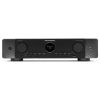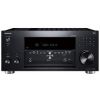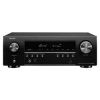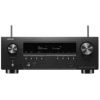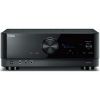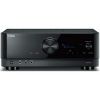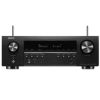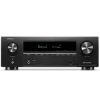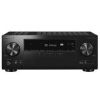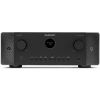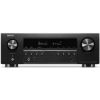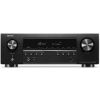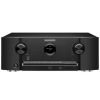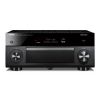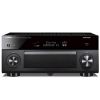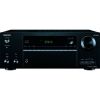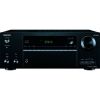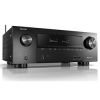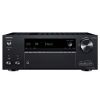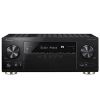Onkyo TX-NR696 vs Yamaha RX-V4A review
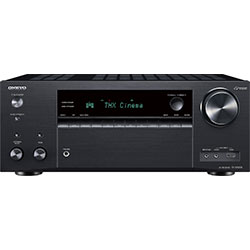
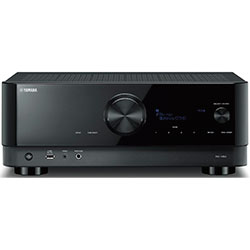
Review of Onkyo TX-NR696 versus Yamaha RX-V4A will reveal the best features offered by the devices. According to the results of our review, Onkyo TX-NR696 received 7.6 points out of 10 possible, and Yamaha RX-V4A was rated 6.5 points. The release date of TX-NR696 is 2019, and RX-V4A is 2020. TX-NR696 is better suited for home theater use than the RX-V4A. Its sound profile is better balanced.
Main advantages Onkyo TX-NR696 over Yamaha RX-V4A
- ✔More channels, namely 7, makes this receiver more profitable than its 5-channel competitor.
- ✔165/6 W/Ohm RMS makes it more productive compared to 80/6 W/Ohm RMS in another receiver in the review.
- ✔Thanks to 2 multi-room zones support, TX-NR696 bypasses its competitor without multizone support.
- ✔Surround sound ensures the availability of Dolby Atmos.
- ✔Object-oriented sound ensures the availability of DTS:X.
Main advantages Yamaha RX-V4A over Onkyo TX-NR696
- ✔Include HDMI eARC function.
- ✔8K/60Hz signal pass-through is available.
Amplifiers
For the built-in amplifier, the devices received different marks - 7 and 6, respectively, on a 10-point scale.
The number of channels is equal to the number of possible connected speakers. The Onkyo TX-NR696 supports 7.2-channels sound, but Yamaha RX-V4A supports a 5.2-channels configuration.
RMS stands for the actual power of the receiver. The higher this value, the louder the sound can be produced. The differences between the models in terms of RMS power are significant - for the TX-NR696 this value is 165/6 W/Ohm, and for the RX-V4A it is 80/6 W/Ohm.
| TX-NR696 | RX-V4A | |
|---|---|---|
| Channels | 7.2 | 5.2 |
| Stereo power (RMS), W/Ohm | 165/6 | 80/6 |
| Output impedance, Ohm | 6 | 6 |
| Frequency response | 10Hz-100KHz | 10Hz-100KHz |
| THD in stereo, % | 0.08 | 0.06 |
Audio features
After reviewing the audio features of each model, we can rate the TX-NR696 9 out of 10, and the RX-V4A - 7.
Most receivers now come with a microphone included. It is with the help of this microphone that the auto-calibration system functions, which adjusts the sound of the receiver to the room.
| TX-NR696 | RX-V4A | |
|---|---|---|
| Digital to analog converter (DAC) | AK4458 384 KHz/32-bit | N/A |
| Bi-amping | ✔ | ✔ |
| Pure direct (straight) | ✔ | ✔ |
| Auto speaker calibration | AccuEQ | YPAO |
| Speaker A/B switching | ✖ | ✖ |
| Other audio features | Advanced Music Optimizer, Theater-Dimensional, Hi-Res audio | CINEMA DSP, Compressed Music Enhancer, Virtual CINEMA FRONT |
Connectivity
The connectivity of competitors in our comparison is markedly different, Onkyo TX-NR696 scored 8, and Yamaha RX-V4A scored 9 out of 10.
Bluetooth connection is now one of the main communication protocols for the receiver's control or even music broadcasting.
| TX-NR696 | RX-V4A | |
|---|---|---|
| Wi-Fi | ✔ | 2.4/5GHz |
| USB | 1 (USB 2.0) | 1 (USB 2.0) |
| Bluetooth | ✔ | ✔ |
| Ethernet (RJ45) | 1 | 1 |
| DLNA | ✖ | ✖ |
| MHL | ✖ | ✖ |
Streaming services
Now music streaming services are gaining more and more popularity. They allow users to listen to millions of songs by subscription.
| TX-NR696 | RX-V4A | |
|---|---|---|
| Apple Music (AirPlay) | AirPlay, AirPlay 2 | AirPlay, AirPlay 2 |
| Amazon Music | ✔ | ✔ |
| Spotify | ✔ | ✔ |
| Other streaming services | Deezer, TIDAL, Pandora, TuneIn Radio | Deezer, TIDAL, Pandora, SiriusXM, Qobuz |
Extensive connections
The presence of many connectors makes the receiver more versatile. But there are also narrowly targeted models, the number of connectors which are limited to a certain area of use. And when choosing their own receiver, users need to consider exactly your goals for using the receiver. For extensive connection, Onkyo TX-NR696 got 7 points, but Yamaha RX-V4A received 5 points.
Onkyo TX-NR696 is equipped with 7/2 HDMI inputs and outputs, and Yamaha RX-V4A has 4/1 HDMI inputs and outputs.
HDMI eARC is the next step in the development of audio return channel technology, which works in conjunction with HDMI 2.1. Using eARC provides the highest sound quality for home audio systems. HDMI eARC is available on Yamaha RX-V4A.
The HDCP encryption protocol is now mandatory for most media devices. This security technology encrypts digital signals from one product to another. HDCP content-encryption protocol is present on Onkyo TX-NR696 in the HDCP 2.2 version, and Yamaha RX-V4A has the HDCP 2.3 version.
Connecting a vinyl player or phonograph is possible using a Phono input which is represented by mini-jack or RCA connectors. Only the TX-NR696 has a Phono interface.
| TX-NR696 | RX-V4A | |
|---|---|---|
| HDMI input/output | 7/2 | 4/1 |
| HDMI ARC (Audio Return Channel) | ✔ | ✔ |
| HDMI eARC (Enhanced Audio Return Channel) | ✖ | ✔ |
| HDMI CEC | ✔ | ✔ |
| Digital content protection (HDCP) | HDCP 2.2 | HDCP 2.3 |
| Subwoofer output (LFE) | 2 | 0 |
| Headphone output | 1 x 6.3 | 1 x 6.3 |
| Optical digital input | 1 | 1 |
| Coaxial digital input | 1 | 1 |
| Composite input | 0 | 0 |
| Component input/output | 0/0 | 0/0 |
| Phono (MM) input | ✔ | ✖ |
| Front panel connectors | HDMI, phones, setup mic, AUX | USB, phones, setup mic |
| Multi channel preamp output | ✖ | ✖ |
Video features
The AV receiver is the heart of the home theater. And in this case, support for all current video formats ensures the best user experience, so it is very important to consider this when choosing a device. Video features of the TX-NR696 were rated 8 out of 10 against the 7 for the RX-V4A.
With the 4K pass-through feature, the AV receiver sends "native" 4K signals to a 4K TV from a video source without any processing. The TX-NR696 works with the 4K/60Hz video, and the RX-V4A has the 4K/120Hz.
The AV receiver passes "native" 8K signals from a video source to 8K TV without any encoding, with the 8k pass-through features. The 8K path-through is available on Yamaha RX-V4A.
| TX-NR696 | RX-V4A | |
|---|---|---|
| HDR (High Dynamic Range) | HDR10 | HDR10 |
| 4K signal pass-through | 4K/60Hz | 4K/120Hz |
| 8K signal pass-through | ✖ | 8K/60Hz |
| HDMI signal pass-through | ✔ | ✔ |
| 3D signal pass-through | ✔ | ✖ |
| HDMI pass-through in standby mode | ✔ | ✔ |
| Video conversion | analog to HDMI | ✖ |
| Analog to HDMI scaling | ✖ | ✖ |
| HDMI to HDMI scaling | ✔ | ✔ |
| Dolby Vision | ✔ | ✔ |
| Other video features | DeepColor, x.v.Color, HLG, BT.2020 | x.v.Color, HLG, BT.2020 |
Additional features
In terms of evaluating additional features, the TX-NR696 got 9 points, but the RX-V4A has 7.
Yamaha RX-V4A has the ECO mode.
| TX-NR696 | RX-V4A | |
|---|---|---|
| Voice control | Google Assistant | Amazon Alexa, Google Assistant, Siri |
| App control | iPhone, iPad, iPod, Android | iPhone, iPad, iPod, Android |
| Display | fluorescent | colour OSD |
| Tuner | AM, FM | FM |
| Sleep timer | ✔ | ✔ |
| Auto power off | ✔ | ✔ |
| ECO mode | ✖ | ✔ |
| Graphical user interface (GUI) | ✔ | N/A |
| Setup assistant | ✔ | ✔ |
| Firmware update | network, USB | network, USB |
| Other additional features | has not | App Control |
Multi-room
As the center of a home media system, each multichannel receiver has an additional set of terminals for connecting the second set of speakers to create additional audio space in Zone 2 or even Zone 3 where audio can have the separate source.
| TX-NR696 | RX-V4A | |
|---|---|---|
| Multi-room zones | 2 | has not |
| Zone audio output | speaker, preout | has not |
| Zone HDMI output | ✔ | has not |
| Multi-room control | FlareConnect | MusicCast |
| RS-232 | 0 | 0 |
| Remote control input/output (IR) | 0/0 | 0/0 |
| DC trigger output (12V) | 0 | 0 |
Multichannel surround
Onkyo TX-NR696 got 7 points for the multichannel surround sound and Yamaha RX-V4A got 5.
Dolby Atmos' particularity is that this is the object-oriented sound format, that is, each audio signal object is independently sounded and connected to its spatial position. Onkyo TX-NR696 can create 3D sound due to the Dolby Atmos support.
DTS:X is an algorithm used by the processor to create sound scenes, where sounds connected directly to objects rather than channels, and to determine the optimum sound output distribution in space. Surround sound with DTS:X is available only on the TX-NR696.
| TX-NR696 | RX-V4A | |
|---|---|---|
| Dolby Atmos | ✔ | ✖ |
| Dolby TrueHD | ✔ | ✔ |
| Dolby Surround | ✔ | ✖ |
| Dolby (other) | Dolby Digital Plus, Dolby Atmos Height Virtualization | Dolby Digital Plus |
| DTS:X | ✔ | ✖ |
| DTS HD Master | ✔ | ✔ |
| DTS Virtual:X | ✔ | ✖ |
| DTS Neural:X | ✔ | ✖ |
| DTS (other) | DTS-ES, DTS 96/24, DTS-HD, DTS-EXPRESS | DTS 96/24, DTS-HD, DTS-EXPRESS |
| Auro-3D | ✖ | ✖ |
| IMAX Enhanced | ✖ | ✖ |
| Multichannel stereo | ✖ | ✖ |
Popular receiver comparisons
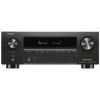
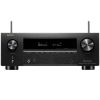
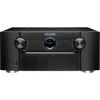
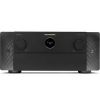
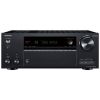


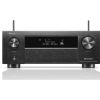
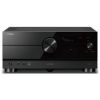
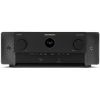
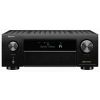

Latest receiver comparisons
